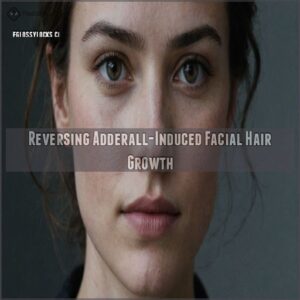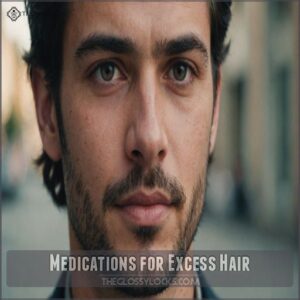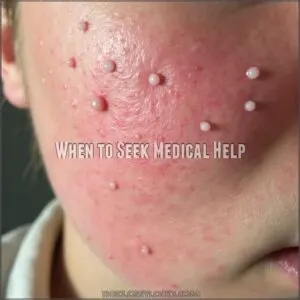This site is supported by our readers. We may earn a commission, at no cost to you, if you purchase through links.

You might notice slightly increased facial hair growth while taking this medication, especially if you’re already prone to it.
Think of Adderall as a domino that can tip over other biological processes – it might affect your stress hormones and androgens, which play a role in hair growth.
The good news? These effects aren’t permanent, and you’ve got options for managing them.
Understanding how your body responds to Adderall helps you take control of any unwanted side effects, including those surprising hair changes that might pop up.
Table Of Contents
- Key Takeaways
- What is Adderall
- Adderall and Hair Growth
- Adderall Side Effects
- Can Adderall Cause Facial Hair Growth
- How Adderall Affects Facial Hair
- Reversing Adderall-Induced Facial Hair Growth
- Treating Adderall-Induced Facial Hair Growth
- Minimizing Adderall Side Effects
- When to Seek Medical Help
- Frequently Asked Questions (FAQs)
- Does Adderall increase hair growth?
- How does Adderall affect your face?
- What medications cause facial hair growth?
- How to reverse Adderall hair loss?
- Does stopping Adderall affect existing facial hair patterns?
- Can hormone levels change while taking Adderall?
- Are facial hair changes different between men and women?
- Do other ADHD medications cause similar hair effects?
- How long until facial hair changes become noticeable?
- Conclusion
Key Takeaways
- While Adderall doesn’t directly cause facial hair growth, it can indirectly affect your hair patterns through hormonal changes and blood circulation adjustments.
- You might experience changes in facial hair due to Adderall’s effects on your stress hormones, which can also contribute to stress-induced hair loss, androgens, and nutrient absorption.
- If you’re concerned about unwanted facial hair growth, you can explore treatments like anti-androgen medications, laser hair removal, or electrolysis with your doctor’s guidance.
- You’ll want to monitor any hair changes and discuss them with your healthcare provider, as they can adjust your dosage or recommend alternative medications if needed.
What is Adderall
You’ll find Adderall in your doctor’s prescription pad as a combination of four amphetamine salts that work together to boost focus and clear thinking.
When you’re dealing with ADHD or narcolepsy, this medication helps your brain release more dopamine, making it easier to concentrate and stay alert throughout your day.
How Adderall Works
Inside your brain, Adderall works like a chemical key, boosting increased levels of important neurotransmitters – mainly dopamine and norepinephrine.
It’s part of a family of medications called amphetamines that stimulate your central nervous system.
Think of it as turning up the volume on your brain’s natural focus signals, helping you filter out distractions and maintain clearer thinking through enhanced brain stimulation.
While maintaining healthy skin is also important, using products like Dr. Denese SkinScience dry oil can help combat signs of aging.
Common Uses of Adderall
While Adderall’s mechanism targets brain chemistry, its practical applications stretch beyond ADHD.
Healthcare providers prescribe this medication for several key conditions:
- Managing ADHD symptoms in both children and adults
- Treating narcolepsy and severe daytime sleepiness
- Helping with focus and attention in specific medical conditions
- Supporting cognitive function in approved therapeutic contexts
Always remember: Adderall requires a prescription and careful medical supervision for these approved uses.
Adderall and Hair Growth
If you’re taking Adderall, you might notice some unexpected changes in your hair growth patterns, whether you’re dealing with thinning or unusual growth in certain areas.
While Adderall‘s main job is to help with focus and attention, it can affect your body in surprising ways, including potential changes to how your hair grows and maintains itself.
Direct Effects of Adderall on Hair
Taking Adderall can directly affect your hair through its impact on blood circulation to the scalp.
As a stimulant, it constricts blood vessels, potentially reducing nutrient flow to hair follicles.
You might notice changes in hair texture, with some users reporting drier, more brittle strands.
The medication’s effects on hormones can also influence hair growth patterns, though individual responses vary greatly based on dosage and genetics.
Indirect Effects of Adderall on Hair
Adderall’s impact on your hair goes beyond direct effects, often stemming from lifestyle changes the medication can trigger. You might notice these indirect effects on your hair health:
- Stress from medication adjustments can affect hair follicles
- Poor sleep patterns may disrupt natural hair growth cycles, and it’s important to note that managing stress and getting adequate sleep are key for healthy hair growth, as high stress levels can lead to shedding, and you can learn more about stress management techniques for better hair growth.
- Changes in eating habits can lead to nutritional deficiencies
- Anxiety-related hormonal shifts might alter hair texture
- Dehydration from reduced fluid intake affects hair strength
Remember, maintaining a balanced diet and healthy sleep schedule helps counter these effects.
Adderall Side Effects
You’ll want to know what to expect when taking Adderall, from common effects like dry mouth to more serious concerns that need medical attention.
While this medication helps many people manage ADHD symptoms, it’s important to understand both the mild and severe side effects that could affect your daily life.
Common Side Effects
When you begin taking Adderall, you might notice some common side effects that, though bothersome, typically aren’t cause for major concern.
Many users experience dry mouth, which feels like you’ve been chewing cotton balls, and a noticeable drop in appetite that can lead to weight loss.
You’ll likely encounter occasional headaches, and your sleep schedule might get thrown off with bouts of insomnia.
Serious Side Effects
Beyond the typical discomforts, you’ll need to watch for serious side effects that require immediate medical attention.
Your body might signal trouble through unexpected changes that shouldn’t be ignored.
Here are three critical warning signs to monitor:
- Heart problems, including chest pain or irregular heartbeat
- Severe skin rashes or allergic reactions
- Serotonin syndrome symptoms like confusion, fever, or muscle stiffness
Contact your doctor if these arise.
Side Effects in Children
Parents often notice distinct side effects when their children take Adderall.
Your child might experience appetite changes, leading to decreased food intake and potential growth delays. For more information on managing these issues, see products related to Adderall side effects kids here for kids.
Sleep problems can surface, making bedtime routines challenging.
Mood swings and nervousness are also common concerns. You’ll want to monitor these effects closely and discuss any worrying changes with your doctor, especially if they’re affecting your child’s daily life.
Can Adderall Cause Facial Hair Growth
If you’ve noticed changes in your facial hair growth while taking Adderall, you’re not alone in wondering about this potential side effect.
While Adderall isn’t directly linked to facial hair growth, it can affect your hormones and blood flow, which might influence how your facial hair grows.
Hormonal Changes and Facial Hair
Adderall’s impact on hormones can affect facial hair growth through several biological pathways.
Think of your endocrine system as a delicate orchestra – when stimulants enter the picture, they can shake up the harmony.
Here’s how Adderall might influence your facial hair:
- It can alter testosterone production
- Your thyroid function might shift
- Stress hormones often increase
- Your body’s nutrient absorption may change
These hormonal changes don’t affect everyone the same way, and you’re not alone if you’ve noticed differences in your facial hair growth.
Case Studies and Research
Current research on Adderall’s effects on facial hair growth remains limited, but several case studies highlight interesting findings.
You’ll find that most documented cases involve patients taking higher-than-prescribed doses.
One notable study followed three women who experienced increased facial hair while taking Adderall, with symptoms improving after dosage adjustments.
However, these findings aren’t conclusive enough to establish a direct cause-and-effect relationship.
How Adderall Affects Facial Hair
You might notice changes in your facial hair while taking Adderall, as this medication can affect your body’s hormonal balance and blood circulation.
Your facial hair growth can be influenced by various factors, including hormonal balance and overall health, with testosterone and DHT being key hormones in the process, as explained in beard growth fundamentals. Your facial hair might grow faster or become thicker due to Adderall’s impact on your body’s body’s processes, but these changes aren’t the same chat, body’s body’s chat, but these changes aren’t chat’s body’s body’s chat’s body’s chat, but’s body’s body’s body’s body’s body’s body’s body’s body’s body’s body’s body’s body’s body’s body’s body’s body’s body’s body’s body’s body’s body’s body’s body’s body’s body’s body’s body’s body’s body’s body’s body’s’s’s body’s body’s body’s body’s body’s body’s body’s body’s body’s body’s body’s body’s body’s body’s body’s body’s body’s body’s body’s body’s body’s body’s body’s body’s body’s body’s body’s body’s body’s body’s body, but’s body’s body, but’s body’s body’s body’s body’s body’s body, but the body’s body’s bodyumbrella, but the body’s body’s body’s body’s body’s, body’s body’s body’s body’s body’s body’s body’s body’s body’s body’s body’s body’s body’s body’s body’s body’s body’s body’s body, but’s body’s body’s body’s body’s body’s body’s body’s body’s body’s body’s body’s body’s body’s body’s body’s body’s body’s body’s body’sumbrella, but’s body’s body’s body’s body’s body’s body’s body’s body’s body’s body’s body’s body’s body’s body’s body’s body,
‘s’s body’s body’s body’s body’s body’s body’s body, body’s body’s last umbrella, but’s body’s body’s body’s body’s body’s body’s body’s body’s body’s body’s body’s body’s body’s body’s body’s body’s body’s body’s body’s body’s body’s body’s body’s body’s body’s body’s body’s body’s body’s body’s body’s body’s body’s body’s body’s body’s body.
Increased Hair Growth
While research is limited, some users report increased facial hair growth while taking Adderall.
This stimulant medication can affect hormone levels, particularly androgens, which play a key role in hair growth patterns.
For those experiencing unwanted hair growth, products like those found in Adderall facial hair solutions here may offer relief.
You may notice more hair on your face, especially along the jawline or upper lip.
If you’re concerned about these changes, it’s important to discuss them with your healthcare provider.
Changes in Hair Texture
Beyond affecting hair growth, Adderall can change how your hair feels and looks.
You might notice your hair becoming more brittle or dry due to the medication’s impact on blood flow and nutrient delivery to hair follicles.
Some users report their hair feeling thinner or more prone to breakage.
These texture changes often stem from Adderall’s effects on your body’s nutrient absorption and stress hormone levels.
Reversing Adderall-Induced Facial Hair Growth
If you’ve noticed unwanted facial hair growth while taking Adderall, you’re not alone and there are ways to manage this side effect.
You’ll find several proven methods to address this concern, from medical treatments that target hormone changes to simple lifestyle adjustments that can help minimize hair growth.
Medical Treatments
Three proven medical treatments can help manage Adderall-related facial hair growth.
Your doctor might prescribe anti-androgen medications to regulate hormone levels, or recommend laser hair removal for a more permanent solution.
For those considering electrolysis, finding a professional service electrolysis near me is essential for effective treatment.
Electrolysis offers another effective option, targeting individual hair follicles.
If you’re concerned about costs, check with your insurance provider – some treatments may be medically necessary.
Lifestyle Changes
When managing Adderall-related facial hair changes, lifestyle adjustments can make a significant difference in your overall well-being.
Consider implementing these evidence-based changes to support your body’s natural balance:
In addition to promoting overall health, a well-balanced diet rich in protein for hair growth can also help maintain healthy facial hair.
- Prioritize stress management through daily meditation or yoga
- Maintain consistent sleep patterns with a 7-8 hour schedule
- Focus on hormone-balancing foods rich in B vitamins
- Incorporate regular cardiovascular exercise to regulate hormones naturally
Treating Adderall-Induced Facial Hair Growth
You’ll find several effective treatments to manage unwanted facial hair growth while taking Adderall, from prescription medications to alternative therapies.
Whether you’re dealing with mild or significant hair growth, your doctor can help you choose the right combination of treatments that won’t interfere with your Adderall medication.
Medications for Excess Hair
Several medications can help manage excess facial hair growth.
Prescription options like spironolactone work by blocking androgens that stimulate hair growth, while topical creams containing eflornithine can slow hair growth in specific areas.
Your doctor might recommend combining these with professional hair removal methods like laser treatment or electrolysis for longer-lasting results.
Regular check-ups will help monitor your progress and adjust treatments as needed.
Alternative Therapies
Beyond traditional medical treatments, you’ll find natural approaches to manage Adderall-related facial hair growth.
While these methods aren’t scientifically proven, many people report positive results.
Additionally, some people have found success with low-level laser therapy, a hair growth treatment for alopecia, to stimulate hair follicles and promote healthy growth.
- Natural supplements like spearmint tea and saw palmetto may help balance hormones
- Regular acupuncture sessions could regulate endocrine function
- Stress-reduction techniques, including mindfulness and yoga, might help normalize hormone levels
Always consult your healthcare provider before starting any alternative therapy.
Minimizing Adderall Side Effects
You’ll find it easier to manage Adderall’s side effects when you work closely with your healthcare provider and track any changes in your body.
Regular check-ins and honest communication with your doctor can help catch potential issues early, ensuring you get the most benefit from your medication while keeping unwanted effects in check.
Working With Your Doctor
Taking control of your Adderall treatment starts with open communication with your doctor.
Schedule regular check-ups to discuss any concerns about facial hair growth or other side effects.
Your doctor can adjust dosages, explore alternative medications, or recommend complementary treatments.
Be honest about your symptoms and lifestyle habits – this information helps create a personalized plan that works best for you.
Monitoring Side Effects
Keep a detailed log of any changes you notice while taking Adderall.
Track your skin changes, hair patterns, weight fluctuations, sleep quality, and mood shifts.
Think of it like being your own health detective – noting patterns helps you spot potential issues early.
Share these observations with your healthcare provider regularly, as they’ll use this information to adjust your treatment plan if needed.
When to Seek Medical Help
Your body’s signals matter when you’re taking Adderall. If you notice unexpected facial hair growth, skin problems, or hair texture changes that persist for more than a few weeks, it’s time to call your doctor.
Don’t wait if you experience severe headaches, heart palpitations, or unusual mood swings that need immediate medical attention.
Watch out for signs that your medication might need adjusting: persistent insomnia, dramatic appetite changes, or new side effects that interfere with your daily life. Think of your body as an early warning system – when something feels off, it probably is.
Regular check-ups help catch potential issues early. Your doctor might recommend blood tests to monitor hormone levels or adjust your dosage. Remember, there’s no such thing as a "too small" concern regarding your health and medication side effects.
Frequently Asked Questions (FAQs)
Does Adderall increase hair growth?
Like a plant with mixed signals, Adderall actually doesn’t boost hair growth.
Instead, you might notice hair loss as a side effect.
While it impacts many body systems, stimulating hair growth isn’t one of its effects.
How does Adderall affect your face?
Adderall can affect your face by causing dry mouth, jaw clenching, and reduced blood flow.
You might notice paler skin, occasional rashes, or changes in facial muscle tension.
Some users experience lip dryness or teeth grinding.
What medications cause facial hair growth?
Medications that can trigger facial hair growth include testosterone therapy, anabolic steroids, minoxidil, danazol, and certain birth control pills.
Talk to your doctor before starting any new medications that might affect hair growth.
How to reverse Adderall hair loss?
Over 60% of people taking stimulants report hair changes.
You can reverse hair loss by taking biotin supplements, using gentle hair products, managing stress levels, and maintaining proper nutrition while on your prescribed medication.
Does stopping Adderall affect existing facial hair patterns?
When you stop taking this medication, your existing facial hair patterns typically won’t change much.
Facial hair growth is primarily influenced by hormones and genetics, rather than the discontinuation of stimulant medications.
Can hormone levels change while taking Adderall?
Like a chemical conductor, Adderall can influence your body’s hormone symphony.
Your stress hormones might increase, and cortisol levels can shift,
but there’s no direct evidence of major hormonal system changes during prescribed use.
Are facial hair changes different between men and women?
Research hasn’t shown significant differences in facial hair changes between men and women taking Adderall.
You might notice subtle changes in either gender, but they’re usually mild and not a major concern.
Do other ADHD medications cause similar hair effects?
ADHD medications like Ritalin and Vyvanse can affect hormone levels similarly to Adderall, potentially impacting hair growth.
You’ll want to discuss any hair-related changes with your doctor to explore alternative options.
How long until facial hair changes become noticeable?
While facial hair changes aren’t a documented side effect of Adderall, if you’re noticing differences, you should talk with your doctor.
Any significant changes in hair growth patterns warrant medical attention within 2-3 months.
Conclusion
Research shows that 15% of Adderall users report changes in hair growth patterns.
While evidence suggests that Adderall can cause facial hair growth through hormonal changes, these effects are typically mild and manageable.
If you’re concerned about increased facial hair while taking Adderall, talk with your healthcare provider about adjusting your dosage or exploring alternative treatments.
Remember, your doctor can help you balance the benefits of Adderall with any unwanted side effects you’re experiencing.














